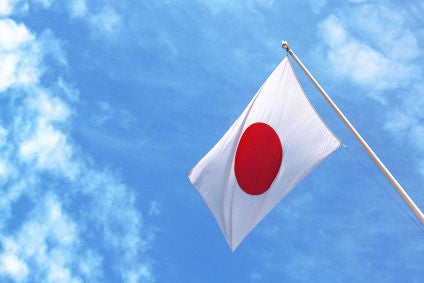
The US has signed a new trade deal with Japan that Washington says will mean more than 90% of American food and agricultural exports to the country will be duty-free or receive preferential tariff access.
Signed yesterday – 7 October – the US-Japan Trade Agreement will provide a boost for American meat and dairy produce businesses attempting to access Japan’s US$5trn economy, the third largest in the world.

Discover B2B Marketing That Performs
Combine business intelligence and editorial excellence to reach engaged professionals across 36 leading media platforms.
Washington said Japan has “committed to provide substantial market access for the US” by either phasing out most tariffs (many immediately), enacting “meaningful tariff reductions”, or allowing a specific quantity of imports at a lower duty (generally zero) where tariff elimination is not possible.
In President Trump’s early days in office, he removed the US from the Trans-Pacific Partnership trade agreement, fulfilling a pledge the US President made during the election campaign.
In March 2018, the 11 remaining countries of the Trans-Pacific Partnership (TPP) signed a revised version of the multilateral trade pact without the US called the Comprehensive and Progressive Agreement for TPP (CPTPP)
Washington yesterday claimed “the tariff treatment for the products covered in this agreement [between the US and Japan] will match the tariffs Japan provides preferentially to countries in the CP-TPP trans-Pacific trade agreement”.

US Tariffs are shifting - will you react or anticipate?
Don’t let policy changes catch you off guard. Stay proactive with real-time data and expert analysis.
By GlobalDataOut of the $14.1bn in US food and agricultural products imported by Japan in 2018, some $5.2bn was already duty free. Under this new tariff agreement, Japan will eliminate or reduce tariffs on an additional $7.2bn of US food and agricultural products.
Japan will provide immediate tariff elimination for US food and agricultural products valued at approximately $1.3bn, including almonds, blueberries, cranberries, walnuts, sweetcorn, lactose, milk albumin, grain sorghum, food supplements, broccoli and prunes.
Another $3bn of US exports will benefit from staged tariff elimination matching access conditions in the CP-TPP agreement, Washington said. This group of products includes processed pork, beef offal, frozen poultry, frozen potatoes, oranges, fresh cherries, cheese and whey, egg products and tomato paste.
For all wheat and barley imports, Japan will provide the same reduction to its wheat and barley “mark up” as provided to CP-TPP suppliers, the US said. Japan’s imports of US wheat and barley were valued at more than $800m in 2018.
In the case of beef, in 2018, the US exported $2.1bn of beef and beef products to Japan, making it the largest export market for US beef, based on value. Under this agreement, the US said it will obtain market access conditions equal to CP-TPP countries, with tariffs for fresh, chilled, and frozen beef reduced from 38.5% to 9% in 15 years. Additionally, Japan will eliminate tariffs on processed beef products, including beef jerky and meat extracts, which are as high as 50%, in five to 15 years.
Japan’s World Trade Organization (WTO) beef safeguard will also no longer be applicable to US beef. Instead, US fresh, chilled, and frozen beef will be subject to an annual US-specific safeguard, which will begin at 242,000 metric tons and will grow 4,860 metric tons per year beginning in year three through to year nine.
In the case of pork, in 2018, the US exported $1.6bn of pork and pork products to Japan, again making it the largest export market for US pork, based on value. Under this agreement, the US said again it will obtain market access conditions equal to the CP-TPP agreement. Tariffs on muscle cuts will be eliminated over nine years, and tariffs on processed pork products, such as the 20% percent tariff on ground seasoned pork, will be phased down to zero in year five.
And, as with beef, Japan’s WTO pork safeguard will no longer be applicable to US pork with US-specific safeguards introduced instead.
Japan’s import tariffs on certain poultry meat, eggs, and egg products will be eliminated in five to ten years, depending on the product, while its 40% cheese tariffs will be eliminated in 15 years, with whey duties eliminated in five to 20 years, depending on the type.
Japan will eliminate duties on many US fruits including fresh cherries, blueberries, raspberries, blackberries, oranges, kiwi, cranberries, peaches, nectarines, apples, and figs over differing periods of time.
It will also eliminate tariffs on most potato products, including immediate elimination of the 4.3% tariff on fresh potatoes and elimination of the 8.5% tariff on frozen French fries over three years.
Japan will immediately eliminate its tariff on 3.2% tariff on essential oils and its 2.4% tariff on dried prunes. It also eliminate duties ranging from 6% to 46.8% on a wide range of canned fruit.
The country will also do away with tariffs on $147m of current imports of vegetables from the US and get rid of its 12% tariff on US peanut butter over five years.
For processed wheat products such as biscuits, cookies, crackers and other bread products, which face import tariffs as high as 26% Japan will shed existing tariffs in five years.





